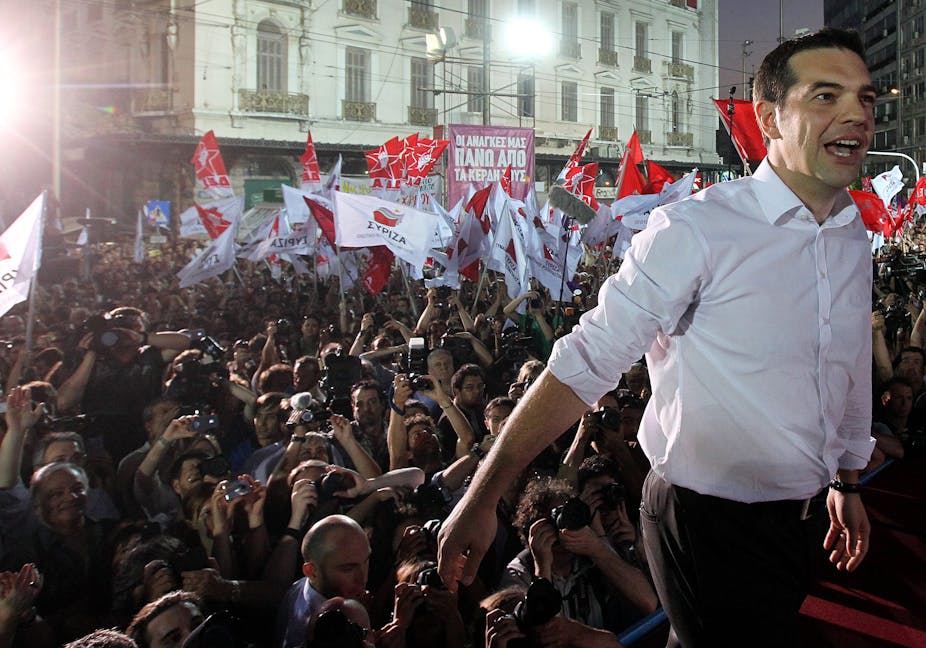To free the age from its captivity,
To create a brand new world,
The discordant, tangled days
Must be linked, as with a flute.
–Osip Mandelstam, The Age (1923)
There is an air of impending disaster in Greece, a country whose plight Sophocles would have appreciated.
Athens is still seedy with skin-toasted tourists and exploitation, but the mood is a bleak one. Millions of Euros are being withdrawn on a daily basis. Rumours are rife that cash controls will be placed on bank withdrawals over the next week.
The policy apparatchiks are wall-to-wall speculating in morbid fashion about the prospects for Greece, scrounging for options and stumping for votes ahead of the June 17 election.
Alexis Tsipras of Syriza is attempting to make as charming a case as possible that the German, and EU position on austerity is intolerable. New Democracy is seeking a renegotiation of the loan terms and is hoping that Pasok, which is likely to be third in the polling, will form an alliance with them to keep the euro.
This in itself seems odious, largely because New Democracy and Pasok’s control over Greece since 1974 did much to propel Greece into this current malaise. Reform did not take place. The public sector expanded with obese enthusiasm. The status quo is the problem – and those two parties represent it. Either way, all parties are in agreement on one thing: bailout terms will be renegotiated, and the euro remains on the cards.

Tsipras has delivered a certain glamour to the electoral contest. Very recently, he invited the firebrand Marxist intellectual Slavoj Žižek to give his opinion before a meeting in Athens. Much of these views have appeared in the London Review of Books. His philosophical stance has a romantic, doomed splendor to it – the Greeks were in a position where they should not be regarded as “victims” (this, he claimed, was grotesque), and nor was it acceptable that Brussels and the International Monetary Fund had gotten it right in making Greece fork out in an unconditional way.
The Greeks, Žižek concluded, were essentially heretics unleashed in an uncongenial world. There are times, he claimed citing T.S. Eliot, that either one stops believing or becomes a heretic. The belief is Europe, and the Greek heresy may well save the European idea. Indeed, Tsipras has it on record that Syriza is “committed to keeping Greece in the eurozone”.
But in terms of pragmatic success, the decision will not be left up to Tsipras unless Syriza can garner enough votes to avoid a coalition with the pro-bailout parties. At this point, this seems highly unlikely.
Economic instability propels votes to conservatives – sheer chaos, however, will push allegiances to both ends of the political spectrum. Žižek is at least right when he regards predictions of doom in such a scenario as self-fulfilling ones.
Besides, the left is hardly united. Nikos Hanias, Syriza’s candidate in Corinth, has very publicly denounced his own party, claiming that its success “if only for an hour” would be disastrous for Greece.
A taste of his anger, and, one suspects, of various veterans of the left, is palpable. “It is shameful and dishonourable that my exploiting the justified rage of society, you are gambling with our future, betting on the non-existent possibility that our creditors are bluffing without proposing something if the case is the contrary, especially when you know that your maximalist and surreal positions have no contact with reality”.
In terms of the political ground, Syriza has targeted civil servants, the beneficiaries of the bloated bureaucratic state that is proving unsustainable, and the chronically unemployed. As Nick Malkoutzis succinctly puts it, “Syriza promises a new start but it also gives the impression that little will change in Greece’s problematic public sector”.
The choice on June 17 will be terrible or catastrophic: wade out the crisis with the euro and wait for a miracle. The alternative of embracing the drachma and leaving the zone is considered simply too awful to contemplate. Spain, an economy considered to big to fail, is now teetering. Italy is jittery.
To spite the lenders, disaster is being courted, and countries considered as part of the outer “euro” could well lead to, if we are to cautiously believe Credit Suisse estimates, a wipe out of 58% value of Europe’s banks. Then, there is the middle ground – to accept the euro but reject the austerity program.
This is the option that is gaining steam with voters, but it is an option that is bound to fail. Mandelstam’s flute is yet to be found, and neither Angela Merkel, or the EU, are going to provide it.

